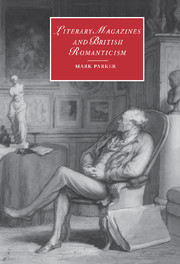Book contents
- Frontmatter
- Contents
- Acknowledgments
- Introduction: the study of literary magazines
- Chapter 1 Ideology and editing: the political context of the Elia essays
- Chapter 2 A conversation between friends: Hazlitt and the London Magazine
- Chapter 3 The burial of Romanticism: the first twenty installments of “Noctes Ambrosianae”
- Chapter 4 Magazine Romanticism: the New Monthly 1821–1825
- Chapter 5 Sartor Resartus in Fraser's toward a dialectical politics
- Conclusion
- Notes
- Bibliography
- Index
- Cambridge Studies in Romanticism
Chapter 1 - Ideology and editing: the political context of the Elia essays
Published online by Cambridge University Press: 22 September 2009
- Frontmatter
- Contents
- Acknowledgments
- Introduction: the study of literary magazines
- Chapter 1 Ideology and editing: the political context of the Elia essays
- Chapter 2 A conversation between friends: Hazlitt and the London Magazine
- Chapter 3 The burial of Romanticism: the first twenty installments of “Noctes Ambrosianae”
- Chapter 4 Magazine Romanticism: the New Monthly 1821–1825
- Chapter 5 Sartor Resartus in Fraser's toward a dialectical politics
- Conclusion
- Notes
- Bibliography
- Index
- Cambridge Studies in Romanticism
Summary
Mario Praz presents a singular picture of Charles Lamb in The Hero in Eclipse – as a man whose essays trace his determined probing of the wounds given him by nascent capitalism, whose ideals are aristocratic but whose place as a clerk is socially ambiguous, and whose “Biedermeier” aesthetic is marked by an “ability to express the quintessence of bourgeois feeling.” This tendentious assessment has not been taken up by later critics, who have preferred immanent or at least more formal approaches to the essays of Elia. But beneath the somewhat programmatic thrust of Praz's remark lies an important yet unregarded aspect of Lamb: the social and political context of his essays.
Book-length studies have traced Lamb's development as a craftsman, examined his creation of a “neutral ground” that permits the exercise of negative capability, presented a reading of the essays from a phenomenological perspective, and provided a deconstructive account of Lamb's examination of the authorial voice and his exploration of time and eternity. Three early articles have considered the essays as prose poems and applied new critical techniques to them. Later studies have focused on his use of irony and the psychological burdens inherent in his relation with Coleridge.
- Type
- Chapter
- Information
- Literary Magazines and British Romanticism , pp. 30 - 58Publisher: Cambridge University PressPrint publication year: 2001

